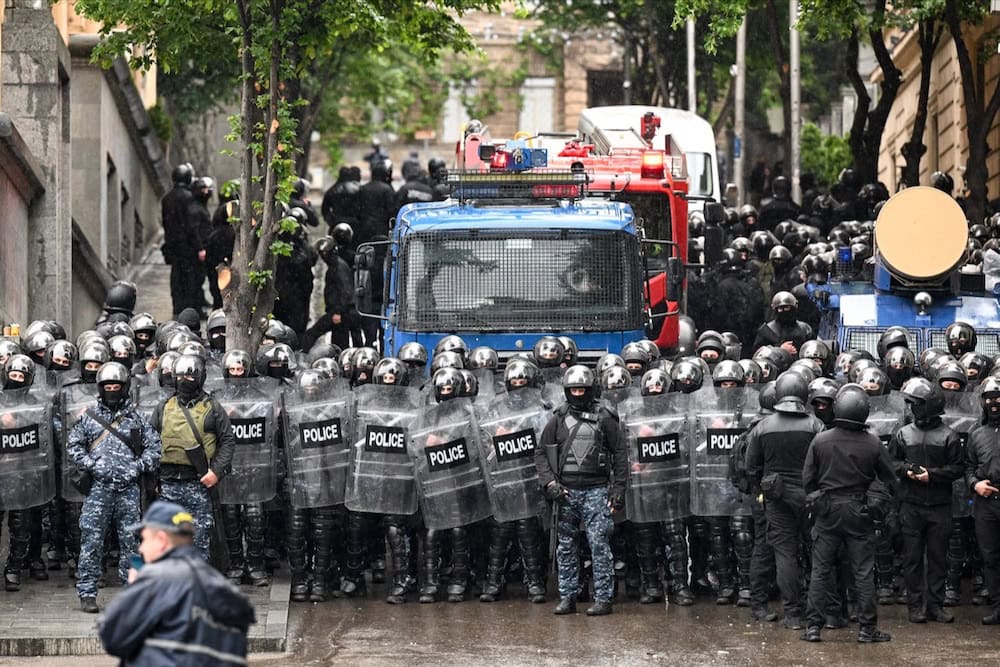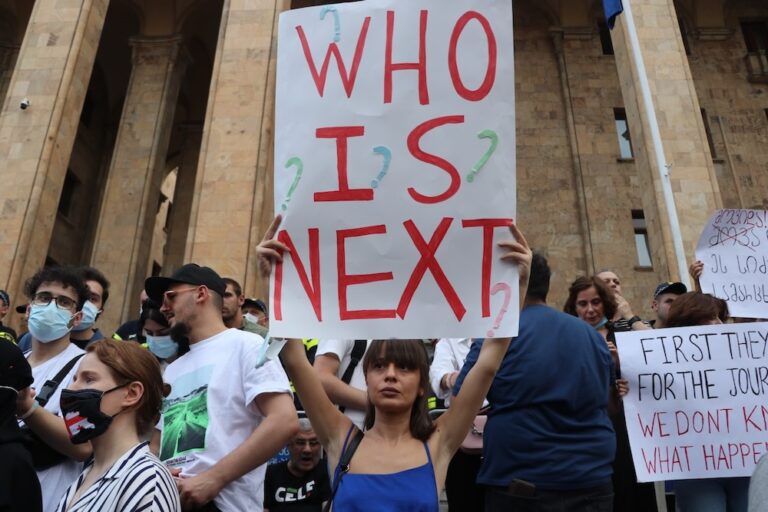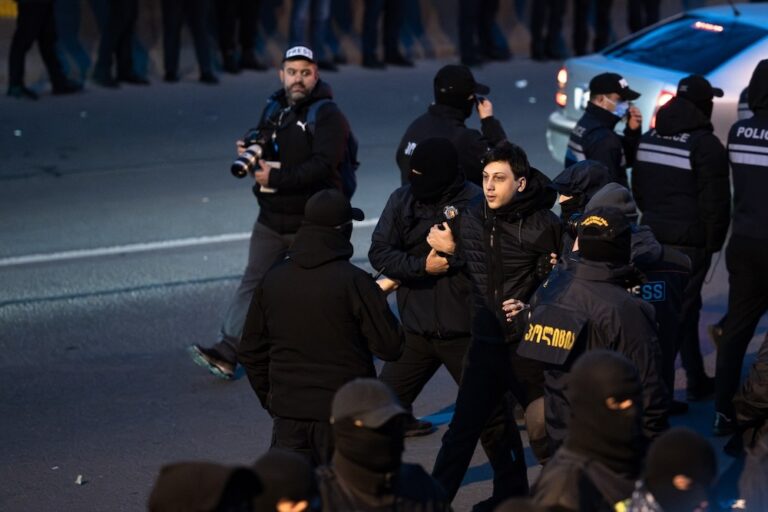The police used tear gas, rubber bullets, water cannons, and mass arrests against the protesters. There have also been reports of physical attacks on government critics and their family members.
This statement was originally published on globalvoices.org on 15 May 2024.
Ruling Georgian Dream party is stirring Georgia into political crisis
Massive protests have roiled Georgia since April 8, 2024, when Georgia’s ruling party re-introduced the controversial foreign agent bill. But despite the month of public outcry and international condemnation, the parliament approved the bill in its third reading on May 13 and adopted the bill on May 14. Meanwhile, as thousands of Georgians continue to take to the streets, the government said it would create a database of “undesirables” namely, “people involved in or publicly supporting violence, threats, and blackmail during the protests.”
There have also been reports of government critics getting attacked in what seems to be a targeted violent campaign to silence voices opposing the bill.
The bill requires all media outlets and non-governmental organizations in Georgia receiving more than 20 percent of foreign funding to register as “foreign agents” and report on their annual income and donor sources. This, according to local civil society, “would entail monitoring from the government, which could compromise organizations’ internal communications and confidential sources.”
In response to the bill, twelve EU foreign ministers have requested that EU officials explain what Georgia’s EU membership path looks like now that the parliament has approved the bill. This comes atop a separate request for targeted sanctions against “those who are steering the country away from its European future” and another call to suspend Georgia’s candidate status, review EU funding of government budget and programs, and an interim assessment of the country’s progress on the implementation of remaining commitments. In the United States concerns were raised in an open letter to the Prime Minister Irakli Kobakhidze urging the Georgian Dream to withdraw the bill.
55 seconds
It took the parliament some 55 seconds to pass the law in its third reading on May 13, according to reporting by Civil.ge. Most opposition MPs and many of the ruling party’s own members were absent during the vote, as they were delayed by police outside the parliament building. The law’s full vote took place on May 14, when it was adopted with 84 ruling party MPs voting in favor, and 30 against.
The hasty decision occurred a day after the biggest protest to date took place in Georgia:
The protest on Sunday, May 12, continued through the night:
As protests raged in the capital and elsewhere across the country, the ruling Georgian Dream Party members continued pressing their support of the foreign agent law. For instance, Prime Minister Irakli Kobakhidze claimed on May 12 that passing the law was what the people of Georgia wanted, despite the hostile atmosphere outside the parliament building.
On May 13, students from several universities in Tbilisi left their classes and joined the protests where they chanted they would “protect the worthy future of Georgia, its independence and the country’s European future,” reported Georgian Service for Radio Liberty.
The will of the Georgian people was also mentioned in a statement issued by over 100 local civil society organizations:
The unprecedentedly large number of demonstrators on May 11 clearly showed that the Georgian people understand the insidious goals of this law, do not give in to the government’s attempt to intimidate the population, and unwaveringly defend the country’s western course. Hear the voice of united and strong Georgian society. The government must withdraw this law unconditionally!
Opposition party members also chimed in. “The government violated the constitution. If they proceed down this road, they will be delegitimized internationally, because international sanctions will be imposed on all the deputies who support this law […] the majority in the Georgian parliament will be [considered to be] representatives of Russia, not of Georgia,” said opposition politician Salome Samadashvili.
“The resistance will continue, not until the law is revoked, but until the Georgian Dream, which has become the Kremlin’s executor in the country, leaves power,” said independent member of parliament, Teona Akubardia.
Police violence
Reports of police violence were rampant through the weeks of protests. Tear gas, rubber bullets, water canons, and mass arrests have dominated local media reports throughout the weeks as well as reports of thugs physically attacking government critics, their family members, and private property.
In an interview with Foreign Policy, Eto Buziashvili, a former advisor to the Georgian National Security Council, said, “What happened during these two days is just an unprecedented level of targeting.”
According to reporting by local outlet OC Media, members of the opposition parties and activists were beaten outside their homes. Activists, politicians, and demonstrators also reported receiving profane and threatening calls from unknown numbers. Previously it was reported that many civil society representatives were targeted by poster campaigns featuring representatives’ faces, with texts that read “traitors, slaves of foreign money,” and the like. Justice Minister Rati Bregadze was quick to push the blame onto demonstrators: “If anyone can organize this kind of disturbance, it is certainly the people who stand at the front of these rallies, who want to [create a spark] of protest in the country.”
The bill on foreign agents was first introduced in March 2023 and was met with outspoken public outcry and international criticism, which forced the ruling party to drop the bill. Just over a year later, on April 3, 2024, the Georgian Dream’s parliamentary leader, Mamuka Mdinaradze, announced their decision to reconsider the bill. The move was largely viewed as a step to draw the country closer to Russia and silence critics ahead of the upcoming parliamentary vote scheduled for October.
Following the ruling party’s announcement, daily protests have been reported. Last month, the European Parliament adopted a resolution condemning the bill and calling for sanctions against the ruling Georgian Dream Party’s founder, Bidzina Ivanishvili. Ivanishvili is a key figure in Georgian politics known for having close ties with Russia.
Meanwhile, several Georgian Dream members have announced their resignations indicating possible cracks in the government. Among them Georgia’s ambassador to France and adviser to the State Minister for Reconciliation and Civic Equality. Since the re-introduction of the bill, Georgia’s president Salome Zurabishvili said she would veto the bill. But a majority in the parliament can override the president’s veto.
Written by Arzu Geybullayeva



